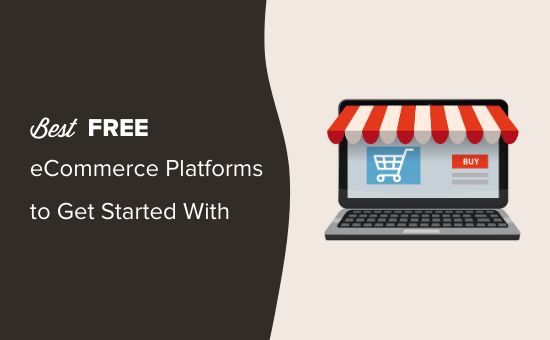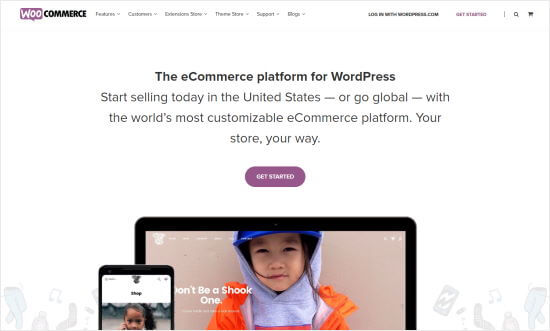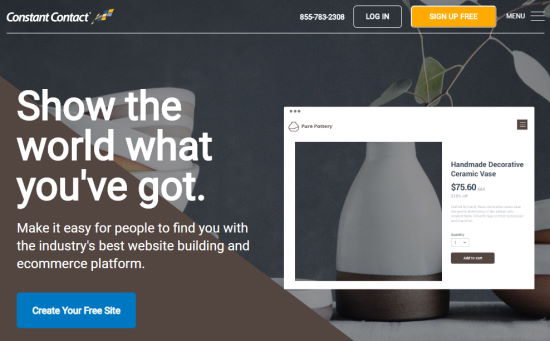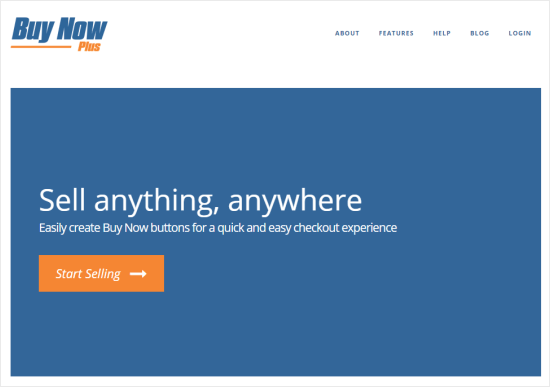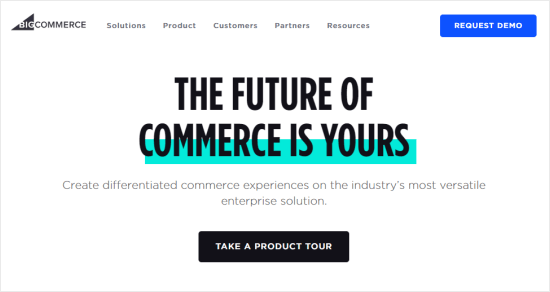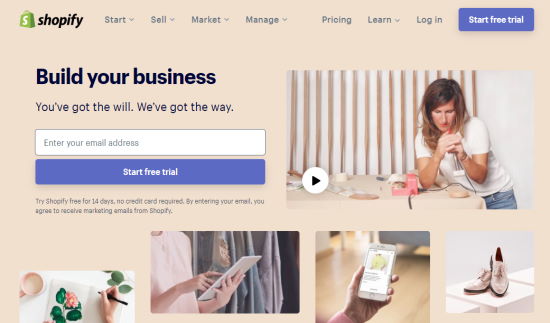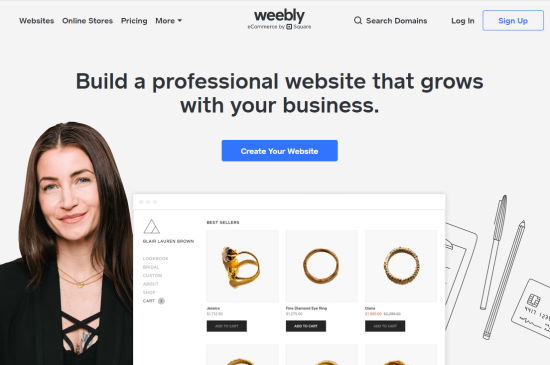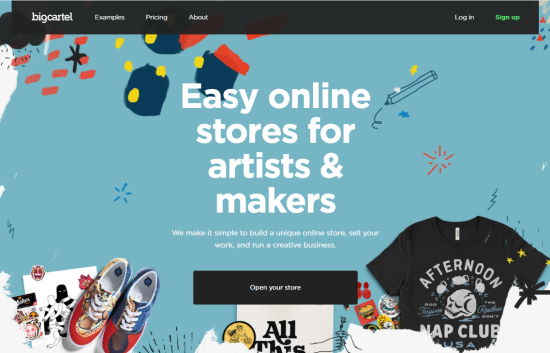Big Cartel is an ecommerce website builder for small businesses and creatives. Known for being affordable and easy to use, Big Cartel’s templates help your artwork and handmade products shine. You can sell anywhere from 5 to 500 products, depending on your monthly plan.
Big Cartel doesn’t take a cut of your sales, which is music to many starving artists’ ears. Read on to find out what we love about Big Cartel—and where it falls short.

Big Cartel Compared
Big Cartel is a good choice for some, but it didn’t make the list of our favorite ecommerce platforms. Shopify can do everything Big Cartel does for artists—and much more. Try Shopify for free for three days and get your first three months for $1/month.
- Shopify – Best all-around ecommerce platform
- Wix – Best for stores with fewer than 100 products
- BigCommerce – Best for large inventories
- Squarespace – Best for cornering a niche market
- Hostinger – Best price for a full online store
Explore these five winners in our review of the best ecommerce platforms.
About Big Cartel
Big Cartel offers an affordable ecommerce platform for artists, boutique shops, and startups. For $0 a month, you can set up an ecommerce storefront with free, customizable templates. This low price lets you sell five products with one product image each. The free plan also allows you to use a custom domain, offer discounts, run promos, track shipments, and calculate sales tax.
The paid plans build on these features. Built by artists and makers for artists and makers, Big Cartel is the small indie business of ecommerce platforms. In turn, it’s an ideal choice for indie businesses with in-person sales channels who want to bring their products online.
Big Cartel Health and Stability
An independently owned ecommerce platform, Big Cartel has been serving customers since 2005. The company says it has helped customers earn over $2.5 billion worth of products. The two co-founders are still part of the team that runs everyday operations.
In a 2018 profile in Forbes, it was reported that Big Cartel made $10.3 million in revenue the previous year. It doesn’t seem like this ecommerce platform is going anywhere.
Even though Big Cartel has a loyal group of customers, the Reddit forum for the site is a ghost town–especially when you compare it to competitors like Shopify, BigCommerce, WooCommerce, and Squarespace. Not only does it have far fewer members, but questions rarely get answered.
And in ecommerce forums, Big Cartel gets mixed feedback. You’ll also have to wade through posts about actual drug cartels to find what you’re looking for. I can’t help but wonder why the founders of an artist-first platform chose a name that brings to mind approximately zero artsy thoughts.
Big Cartel Pricing
Big Cartel offers three pricing plans. True to its commitment to artists, creatives, and makers, it doesn’t come with an enterprise option.
Big Cartel Pricing Structure
You can choose from three Big Cartel plans: Gold, Platinum, and Diamond. The Gold plan is free of charge, but you can only sell 5 products. Each product gets one image to help you show it off. You’ll get free, customizable themes, shipping and order tracking for your customers, and the ability to offer discounts.
Platinum gives you 50 products to sell, and with Diamond, you can list 500 products. Both the Platinum and Diamond plans come with five product images per product. You’ll also get theme code editing, Google Analytics, inventory tracking, and everything offered in the Gold plan.
Big Cartel Pricing Comparison
Big Cartel is less expensive than its main competitors, Shopify and Wix. But even Big Cartel’s most expensive plan, which is just $20 a month, has limits that Shopify and Wix do not.
Shopify’s basic plan lets you sell unlimited products—none of Big Cartel’s plans allow that. If you pay monthly for Shopify Basic, you’ll shell out $39 a month but get some of the most powerful ecommerce features.
These include everything you’d get with Big Cartel’s most expensive plan. But you’ll also get tools for customer segmentation, shopping cart recovery, and shipping discounts. And you can sell from 1,000 inventory locations and offer language translation for customers around the globe.
Wix is Big Cartel’s biggest competitor when it comes to selling art and other creations. Its basic and mid-tier plans give you specific tools for monetizing music, videos, digital prints, and physical prints. And that’s on top of an impressive suite of ecommerce tools—plus unlimited product listings and abandoned cart recovery.
Big Cartel Trials and Guarantees
Big Cartel’s Gold plan is free forever. If you’re only selling a few products, it’ll work just fine—without costing you a dime. You don’t even need to enter credit card information to use it. If you want to upgrade to a paid plan, you can do so at any time.
Big Cartel Ecommerce Platforms Review
Big Cartel is devoted to being the best ecommerce platform around for artists and small businesses. Still, it’s missing some of the features you can find in Wix, Squarespace, and even Shopify. These three platforms aren’t solely dedicated to artists, but they do make it a priority to offer services tailored to creatives.
You can see how Big Cartel stacks up by checking out our list of the best ecommerce platforms.
What Makes the Big Cartel Ecommerce Platform Great

Dedication to Creatives: Artists may not have tons of extra time to spend configuring an ecommerce website. They want something quick and easy to set up, and that’s exactly what Big Cartel is for. In some ways, the website’s limits make life simpler for artists, many of whom are also working a day job while trying to make money with their art.
Affordability: Making money as an artist, small business, or musician is notoriously difficult. I really appreciate Big Cartel’s freemium plan and low pricing for its other two tiers. There’s no enterprise plan, hidden fees, or high-priced add-ons to make your monthly costs skyrocket.
Versatility: For a small and inexpensive product, Big Cartel is the little engine that could. You can put your shop into vacation mode, choose how to price your shipping, and even offer coupons and sales.
Intuitive Dashboard: Big Cartel users praise the user-friendly, intuitive dashboard. When you’re short on time, nothing is worse than glitchy software or confusing interfaces. Big Cartel has neither.
Marketing Integrations: Just like with the bigger ecommerce platforms, you can integrate powerful marketing tools with your Big Cartel storefront. The options are limited compared to competitors, but you’ll still find favorites like Instagram, LiveChat, MailChimp, and Lucky Orange.
Where Big Cartel Ecommerce Platform Falls Short

Limited Scope: Big Cartel’s competitors—particularly Shopify, Wix, and Squarespace—offer services to big and small businesses. Ecommerce reselling giants and small artists. Not Big Cartel. While I admire the platform’s commitment to creatives, I have to point out that scaling isn’t easy with Big Cartel. If your art shop blows up, you’ll outgrow Big Cartel quickly.
Product Restrictions: Most ecommerce platforms allow you to sell unlimited products. This isn’t true of Big Cartel. Even with the highest-paid plan, you’re capped at 500. Ouch!
Templates: Big Cartel only offers 18 templates. You can customize them with code, but still—18 is a low number compared to Wix’s 800+. And Shopify’s 100+ included templates. And Squarespace’s 150.
Limited Product Presentation Options: A good first impression of your product is worth its weight in gold. Unfortunately, Big Cartel offers minimal customization options for product presentation. The Gold (free) plan allows just one product image per product, which is less than what customers expect these days. Even the Diamond (most expensive) plan only offers five product images. Shopify gives you a whopping 250. Wix gives you 15.
CSV Export: If you want to switch from Big Cartel to BigCommerce or Etsy somewhere down the line, it’ll be a laborious process. There’s no CSV export tool to help you transfer your product catalog to a different site. You can export orders, but that’s it.
Big Cartel Ecommerce Platform Compared
Big Cartel didn’t earn a spot in our pool of favorites, but Shopify did, and you can read all about it on our list of the top ecommerce platforms.
- Shopify – Best all-around ecommerce platform
- Wix – Best for stores with fewer than 100 products
- BigCommerce – Best for large inventories
- Squarespace – Best for cornering a niche market
- Hostinger – Best price for a full online store
Final Verdict
Big Cartel can be a good choice for musicians, artists, and creatives. This is especially true if these sellers don’t want to host their product catalog on another company’s storefront, as they’d have to if they used Etsy or eBay.
But because Big Cartel doesn’t make it easy to export your product catalog or scale up to more than 500 products, it’s not the best choice for most sellers. You can get everything Big Cartel offers and more on sites like Shopify, Wix, and Squarespace.


